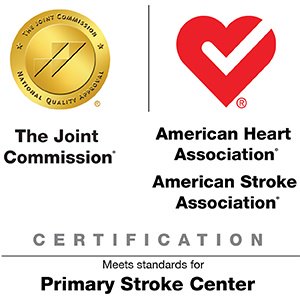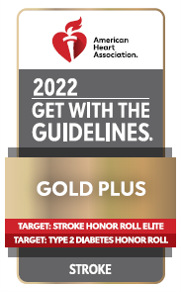Stroke Care
Expect timely care from UNC Health Johnston doctors, nurses, and hospital staff specially trained to respond to a stroke—reduced blood flow to part of the brain.
Rapid Response
 Within minutes of arriving in the emergency room (ER) with stroke symptoms, you’ll receive a computed tomography (CT) scan to check blood flow to your brain. Nurses will record your weight and vital signs, including blood pressure.
Within minutes of arriving in the emergency room (ER) with stroke symptoms, you’ll receive a computed tomography (CT) scan to check blood flow to your brain. Nurses will record your weight and vital signs, including blood pressure.
Telemedicine
An offsite neurologist (brain doctor) will receive your health information. This specialist uses video and audio technology to observe your symptoms and make a diagnosis. Other health care professionals will be with you in person.
 On average, UNC Health Johnston patients see a neurologist via telemedicine within 10 minutes of arrival at the ER. This is faster than the national standard and helps improve your outcome.
On average, UNC Health Johnston patients see a neurologist via telemedicine within 10 minutes of arrival at the ER. This is faster than the national standard and helps improve your outcome.
Ischemic Stroke Treatment
If you get a diagnosis of ischemic stroke—the most common type of stroke—you may receive a drug called tissue plasminogen activator (tPA). This medication dissolves the clot blocking the brain’s blood supply and can stop the stroke if given within several hours of your first symptoms.
Your care team may use CT angiography to find your clot and determine whether you qualify for mechanical thrombectomy. This procedure threads a tiny device through your blood vessels to pull out the stroke-causing clot. If you’d benefit from this treatment, we’ll quickly and safely transfer you to our partners at UNC REX Hospital or UNC Hospitals, or to another hospital that can perform this procedure.
Hemorrhagic Stroke Treatment
Your stroke is less likely to be hemorrhagic—due to a burst blood vessel spilling blood into the brain. For treatment, UNC Health Johnston will transfer you to a hospital with the tools to stop the bleeding.
Transient Ischemic Attack (Mini Stroke)
Your stroke symptoms may happen because of a transient ischemic attack (TIA)—a temporary loss of blood flow to the brain. Also called a mini stroke, TIA warns of the risk for a full stroke.
TIA sometimes happens due to cardiovascular conditions, such as atrial fibrillation or high blood pressure. So doctors may prescribe medicine to treat your heart or blood vessels and help prevent a stroke.
Recovery & Rehabilitation
Expect to spend some time in the intensive care unit for round-the-clock monitoring as you recover from a stroke. In the following months, make life easier by taking advantage of these services:
- Case management – Helps make sure you have home medical equipment and services to ease your recovery
- Home health care – Provides therapy and nursing services
- Nutrition counseling – Offers guidance on what to eat to maintain your health and reduce your risk of another stroke
- Rehabilitation – Restores as much ability as possible to move, do daily tasks, swallow, and speak
You’ll also receive a referral to a local neurologist for follow-up appointments to check the health of your brain over time.